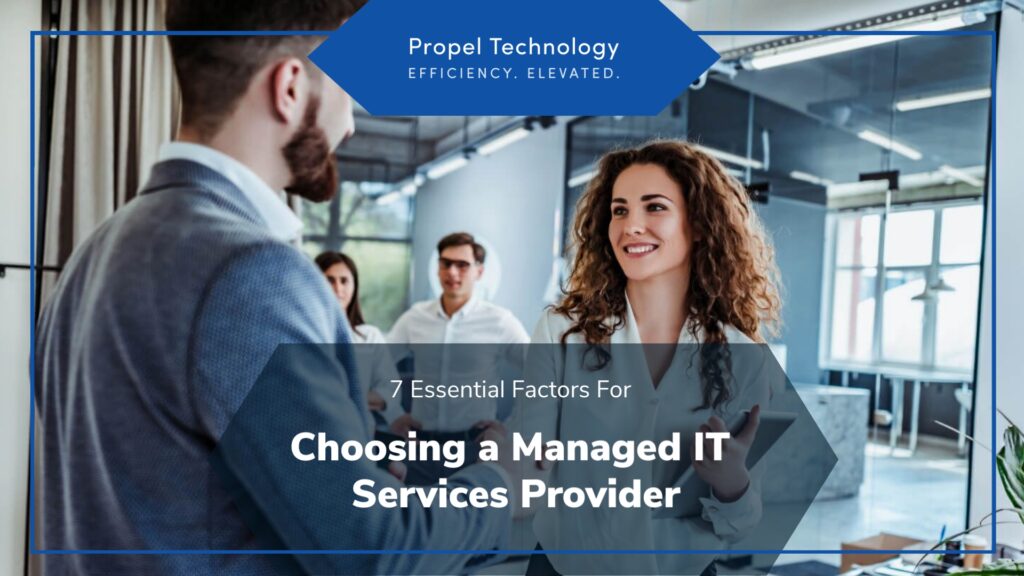How to Choose a Managed IT Services Provider

Selecting a Managed IT Services Provider (MSP) for your business constitutes a decision that demands careful deliberation.
The correct MSP can facilitate your company’s optimization of its IT operations, bolster security, and stimulate innovation. Conversely, an ill-suited MSP could result in operational disruptions, security breaches, and financial losses.
According to Gartner, a staggering 75% of organizations utilizing MSPs are predicted to encounter service disruption within the upcoming two years, primarily due to the providers’ lack of adequate risk management measures.
| “The digital transformation era has made it abundantly clear that choosing the right MSP is not just about IT support, but about partnering for business success,” ~James Bishop, Partner, Propel Technology |
In this blog, we will break down the topic for you so you can make an informed decision.
1. Expertise and Certifications
MSPs manifest in a diverse array of forms and sizes, and their respective areas of expertise can exhibit substantial variation. When attempting to discern how to select managed security services, it is imperative to verify the certifications held by the MSP.
For instance, certifications such as Certified Information Systems Security Professional (CISSP) or Certified Ethical Hacker (CEH) serve as indications of the MSP’s proficiency in IT security. The absence of these certifications could imply that the MSP is inadequately equipped to safeguard your company from cybersecurity threats.
Additionally, industry-specific certifications, including HealthIT for healthcare providers, signify that the MSP comprehends the distinct IT requirements unique to your industry.
Need a New IT Partner That Actually Meets All of Your Business Needs?
See why we’re the preferred choice for more businesses!
2. Reputation and Reviews
An MSP’s reputation is a valuable indicator of the quality of its services. Online reviews on platforms like Google or Trustpilot can provide insights into the MSP’s strengths and weaknesses.
When evaluating the MSP’s reputation, consider the managed services selection criteria mentioned in customer testimonials.
Are clients praising their responsiveness, expertise, or security practices? Negative reviews can also be informative. How does the MSP respond to criticism? Do they take responsibility and work to resolve issues?
A transparent MSP that learns from its mistakes can be a valuable partner. According to a report from Spiceworks, 84% of companies said online reviews influenced their decision when selecting an IT service provider.
3. Service Level Agreements (SLAs)
SLAs are essential documents that define the expectations and responsibilities of both the client and the MSP. An SLA outlines the services the MSP will provide, the response times for support requests, and the remedies available if the MSP fails to meet these obligations.
Before signing an agreement, make sure you understand the terms and have your MSP qualifying questions ready.
Does the SLA specify uptime guarantees? What is the protocol for handling security breaches?
A clear and comprehensive SLA is a sign of an MSP that takes its commitments seriously.
4. Data Security and Compliance
In the modern digital era, data security and compliance have ascended to positions of paramount importance. With the proliferation of cyber threats and increasingly stringent regulatory requirements, selecting an MSP capable of safeguarding your data and ensuring compliance is vital.
In determining how to choose managed services providers, it is essential to pose questions during MSP discovery concerning their approach to data security.
What encryption methodologies do they employ? How do they address data breaches? Do they offer services such as vulnerability assessments or penetration testing?
If your industry is subject to specific compliance requirements, for example, HIPAA for healthcare or PCI DSS for retail, it is crucial to ascertain that the MSP has a documented history of compliance with these standards.
According to an IBM study, the global average cost of a data breach in 2020 reached an astounding $3.86 million, underscoring the significance of robust data security.
5. Customization and Scalability
Each business possesses unique IT needs, rendering a one-size-fits-all approach suboptimal. An MSP should be equipped to customize its services to cater to your specific requirements.
Inquire about their capacity for service customization and their experience with enterprises of similar size or industry. Scalability is another factor of critical importance. As your business grows, your IT needs will evolve. Is the MSP capable of adapting to these shifts? Can they provide support as you venture into new markets or locales?
Pose detailed technical questions to qualify MSPs based on their ability to offer services that are both customized and scalable.
6. Support and Responsiveness
When IT issues emerge, swift support is crucial. Downtime can have a substantial impact on your business, affecting productivity, customer satisfaction, and revenue. Understanding the benefits of remote IT support as per CloudSecureTech can offer additional perspectives on how remote support services play a pivotal role in minimizing downtime and enhancing business continuity.
When considering how to choose managed services providers, pose questions to IT MSPs regarding their support offerings. Do they provide 24/7 support? What is their average response time? Do they offer both remote and on-site support?
According to a survey conducted by Information Technology Intelligence Consulting, a staggering 98% of organizations reported that an hour of downtime incurs costs exceeding $100,000.
Consequently, selecting an MSP that can reduce downtime and promptly address issues is vital.
7. Pricing and Contract Terms
While cost should not be the singular factor influencing your decision, it is an important consideration.
Compare the pricing structures of various MSPs and ensure alignment with your budgetary constraints. Exercise caution when considering providers offering services at prices significantly lower than competitors, as this may suggest a compromise in service quality.
Inquire about contract stipulations. Are there any undisclosed fees? What is the duration of the agreement, and what are the terms for renewal or termination?
Utilize managed services vendor selection criteria that contemplate both pricing and contract terms.
Questions to Consider When Choosing an MSP
| Criteria | Questions to Ask |
| Expertise | Do you have certifications relevant to my industry? |
| Reputation | Can you provide customer testimonials or case studies? |
| SLAs | What are your response times for support requests? |
| Data Security | How do you handle data breaches? |
| Customization | Can you tailor your services to my specific needs? |
| Scalability | Can you support my business as it grows? |
| Pricing | Are there any hidden fees in your pricing? |

Got Questions to Ask an IT MSP? Just ask Propel Technology!
Choosing the right MSP is crucial for your business’s success. By considering these seven factors, you can select an MSP that aligns with your IT needs, enhances security, and drives innovation.
Remember, the right MSP is a partner in your success.
Propel Technology offers a free consultation where we can diagnose your IT needs together. Don’t hesitate to reach out and get the tailored IT services your business deserves. Contact us today!
Sign up for the Propel Technology Blog newsletter
